A Question
I begin this post with a serious question, particularly for non-chemists. If I say the following to you, does it make sense?
I would love to be done with my taxes by now, but there’s such a high activation barrier to getting starting that I keep putting them off.
Is “activation barrier” something people say?! I mean, is that a thing?
I’m concerned that it’s just a chemistry term that somehow crossed over into my normal everyday English vocabulary. I spend 99% of my time with other chemists, for whom this phrase is perfectly commonplace, so I may be a tad out of touch with how the rest of society speaks.
Feeling linguistically disoriented, I sought feedback from my mom, who is not a chemist. Here’s how our conversation (via Google chat) went:
My mom’s response suggests that “activation barrier” is not a common slang phrase in the English language. She may not be up on all the trendiest lingo, so I also checked the super reliable Urban Dictionary. There is currently no entry for “activation barrierThey do have an entry for 'activation energy', but it's just a chemistry definition, not slang”. If Urban Dictionary doesn’t have it, then the phrase must not be in common use. (right?)
Explanation of an Activation Barrier
To my mind, at least, the chemistry concept of an activation barrier has a lot of parallels in real-life. So it’s worth explaining what this idea is.
In chemistry, an activation barrier is a concept intimately related to energy. Energy is, admittedly, a rather nebulous notion. It’s the ability to do stuff (rather than just be idle). A person with a lot of energy can run around all day long, but a person without a lot of energy might prefer to spend the day in bed. Hummingbirds and tortoises work well as examples of high- and low-energy entities.

Like people or animals, molecules have energy. Some molecules inherently have more energy than others just because of their structure. On the other hand, molecules can be “given” more energy by, say, heating them up. Or shaking them up, or sometimes even by shining light on them.
One of the fundamental laws of physics2nd law of thermodynamics, I think? dictates that molecules are always trying to get rid of energy and become less energetic. Less energetic = more stable.
Let’s say that molecule A inherently has a lot of energy, and molecule B inherently has less energy. If there is some way for molecule A to undergo a chemical reaction to become molecule B, it’s going to want to try. However, for molecule A to become the lower-energy B, it first has to muster up a little bit more energy than it already has. That extra bit of energy is called the activation barrier to the reaction.
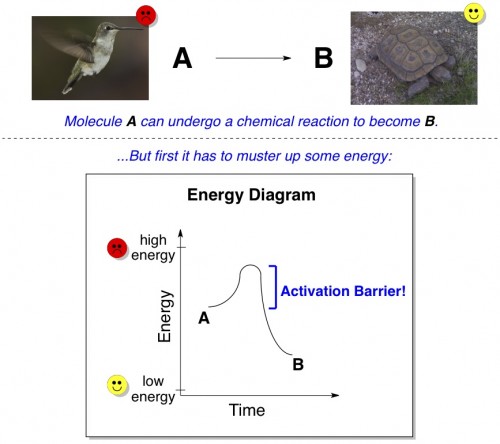
We are very lucky that some chemical reactions have extremely high activation barriers. For example, all organic molecules, such as those composing our bodies, consist primarily of carbon, oxygen, nitrogen, and hydrogen atoms. Our body’s molecules could undergo reactions that would rearrange all the atoms to become much more stable molecules – CO2 (carbon dioxide), H2O (water), and N2 (nitrogen gas).
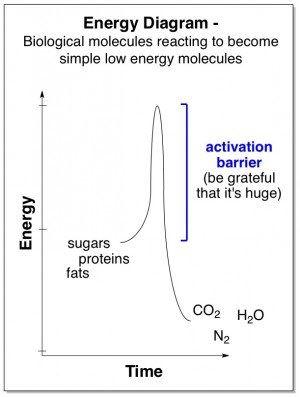
Fortunately the activation barrier to this reaction is very very high. It would take a huge amount of energy input (e.g., temperatures as hot as a fire) to allow our bodies’ molecules to undergo this reaction within a normal period of time.
This concept is quite analogous to real-life. Let’s say that you are at home, and you wish that you had some ice cream. You would feel happier (more stable) if you were eating ice cream… but first you’d have to put your shoes and coat on and drive all the way to the store, and it’s just not quite worth all the fuss. The unpleasant requirement to expend energy driving to the store is the activation barrier to you acquiring ice cream.
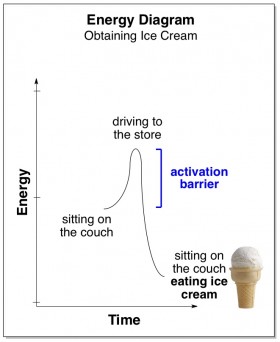
Proposed Update to the English Language
So, all that being said, I’d like to argue for the introduction of the term “activation barrier” (and its derivatives) as a normal idiom in the English language:
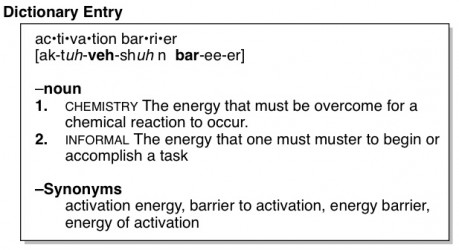
This phrase should be in common use for the following reasons:
(1) It’s a highly useful expression (see Sample Sentences, below). It can convey a meaning more precisely and clearly than some other vocabulary choices.
(2) If common language drew more expressions from scientific jargon, it might help to demystify the whole science thing for the layperson.



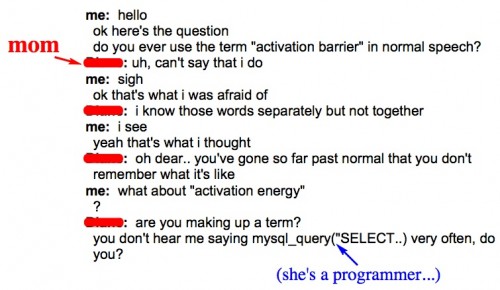
It made perfect sense to me and at the moment I read that particular paragraph and before reading any further, I thought, “She’s writing about me!” but of course that was simply a spontaneous paranoid reflex. Another simultaneous thought that occured at the same moment was that “activation barrier” is a very apt and creative term. Until reading further, I thought you’d made it up. Here is another use for it: The most common activation barrier to going for a run is that of putting on one’s shoes and going out the door.
I have used this when talking to my class about kinetics and catalysis by giving the following example:
We are going to be having a non-mandatory class this saturday morning at 7 am. How many of you would come?
If I offered you $20, how many would show up?
What if I offered each of you $100 to come to a 7am class on Saturday morning, how many of you would be here?
I then go on to talk about activation energy and blah blah blah. Its pretty amazing how well the statistics for the example where you are paying people trend with statistics for a real chemical process.
This is funny because I actually use the term “activation barrier” in normal conversation and assume that everybody understands.
I often use phrases like this and get blank stares and I have to wonder if 1.it is a scientific term that nobody else understands, 2. it is a Canadian term that American understands (e.g. pass me the Robertson screwdriver)., 3. I am just speaking gibberish and need more coffee.
I love it! I’m not a chemist and therefore don’t use this term, however being an engineer I am very guilty of taking terms from my work and applying them in normal conversation and since most people I interact with are all engineers I am blissfully unaware of what I’ve done. Until I get together with some other friends and for some reason they’re looking at me blankly and then it’s all rather embarassing:)
In any case I think it’s a fantastic term, so precise and clearly fills in a gap in the english language. I got it the moment I read it especially since that is exactly why I haven’t started doing my taxes yet (sounds so much better than saying I’m just lazy). I will for sure try to use it. Now where to find that extra energy needed to get started on those taxes…
No, it’s not commonly used in the English language, but I wouldn’t let that stop you from saying it. 🙂 I’m going to go out on a limb and say that most people you encounter can tell pretty quickly that you are smart. Is there really any point to “dumbing yourself down”? However, if you are giving a seminar or teaching a class of non-scientists, you may want to watch the language you use and make sure it is appropriate to your audience.
Glad some of you (commenting here + twitter) use this term too! I think I’ll try to consciously use it amongst non-chemists next time I have the opportunity – I’ll just have to be careful to embed it in enough context. Maybe no one will notice that way.
@Matt, that sounds like an excellent way to teach the concept. Furthermore, one could say that a $100 bill is a catalyst, since it lowers the activation barrier! (Except that it will probably be consumed/spent, so in that regard the analogy fails… plus you need a stoichiometric amount of bills, one equivalent per person.)
I use the phrase “barrier to entry” for how difficult something is to learn. Maybe your mom does too. The barrier to entry for learning Lisp is way higher than for learning BASIC. The barrier to entry for learning violin is higher than for piano at first. With the violin, it sounds like the death cries of a cat until you have your finger at the exact right position to get the right pitch on the string, get your bow straight, move the bow at the right speed and with the right pressure. For a piano, you just press a key. But soon, the polyphonic piano is at least equally difficult.
Very interesting, and that explanation does make a lot of sense. I’m not personally too familiar with the phrase “barrier to entry” – or at least I don’t hear it frequently amongst my chemistry peers. I’m gonna see how long it takes for my mom to notice this comment and maybe give her opinion.
Sorry, the activation barrier to catching up on your posts has been unreachably (and temporarily, I hope) high due to a strong undertow of client demands. Now that you’ve explained it, I think “activation barrier” is a fine addition to common speech. “Barrier to entry” is a pinch more English-like, but requires more energy to say even though it’s one syllable shorter. It also seems to have narrower application, whereas “application barrier” can be applied to almost any activity.
if anyone can get ‘activation barrier’ into everyday language, i have a feeling it will be you! but thank you for another illuminating peek into science….love it!
It would be fun to have that in everyday language. Me (fresh chemistry graduate) and my sister (a chemistry professor) use that a lot in casual conversations that our other sister (communication arts person) starts to get the hang of it! We’re glad she’s getting into our wavelength (yeah, another ‘nerd’ term we often use). 😛
superb! i’ve gotten through the 5 newest posts, and i’m lovin’ it! i’ve really enjoyed your blog.http://www.detetizar.com